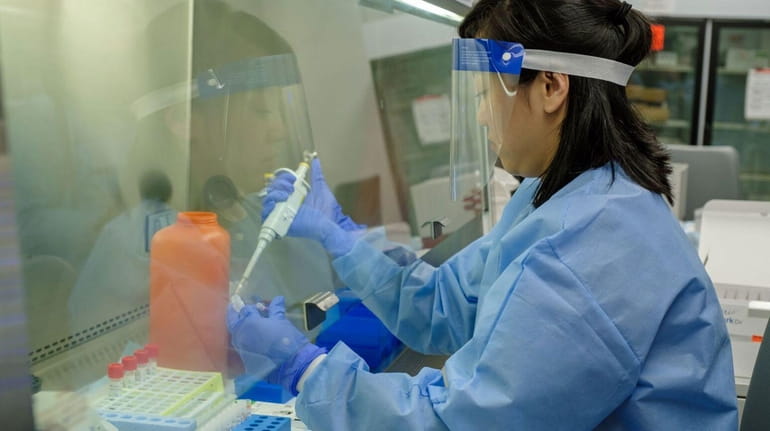Virus demands an all-out assault

Ka Wai Chan, a Northwell Labs medical technician, demonstrates a COVID-19 test. Credit: Northwell Health/Northwell Health/Lee Weissman
The sweeping impact of the coronavirus pandemic reverberated in extraordinary ways Thursday, as the virus’ ramifications on the health care system, economy and society grew clearer.
The shuttering of Broadway theaters, the suspension of most large-scale sporting events, the stoppage of visitors to nursing homes, and so much more, came even as the virus continues to spread. Even the happiest place on earth — Disneyland — shut its gates through the end of the month.
This likely is just the beginning, as New York simultaneously tries to stop the spread of the coronavirus — at least 328 cases statewide — and deal with its consequences.
Gov. Andrew M. Cuomo’s wise efforts to ban large gatherings, prohibiting anything above 500 people and requiring venues below that number to reduce capacity by half, are necessary. But the economic impact can’t be overstated. This isn’t going to be a short-term blip on the region’s radar; it will be financially shattering for many individuals, small businesses, localities and the state. One example: Long Island Rail Road ridership has plummeted 31 percent.
As vital as it is to try to control the spread of the virus, Cuomo also recognizes the simultaneous challenge of coping with the likely onslaught of patients who will need hospital care. Cuomo’s suggestions, from limiting elective surgeries to utilizing medical school personnel, could be helpful. The need for additional facilities and increased staffing are key. Particularly important: Having former or retired doctors and nurses, some of whom are in the target age range of those considered vulnerable to the virus, return to their hospitals. Bless them if they do, we will need them.
Meanwhile, the nation’s ability to test those who need such care is still vastly inadequate. South Korea is doing 20,000 tests a day. On its best day, the United States hasn’t gotten above 1,300, and the nation did just eight on Tuesday, according to the Centers for Disease Control and Prevention.
That’s terrifying.
New York wants to do more — but can’t because it hasn’t received federal approval for fully automated, higher-capacity testing. The state also should be given the go-ahead to test New Yorkers’ blood samples to determine whether they were previously infected by the virus and built immunity to it.
Those tests are being used in other countries, and the United States must make them available here. Knowing whether you had acquired resistance to the disease would lower anxiety and identify those who could be in close contact with you and others who are ill.
The federal government must give New York, and every other state, every tool possible. If federal officials can’t provide the necessary approvals, state and local officials should start the testing anyway.
During this crisis, we need leadership. If we can’t get it from the White House, we’ll rely on Cuomo and other local leaders to make the right choices to keep us as safe — and healthy — as possible.
— The editorial board
